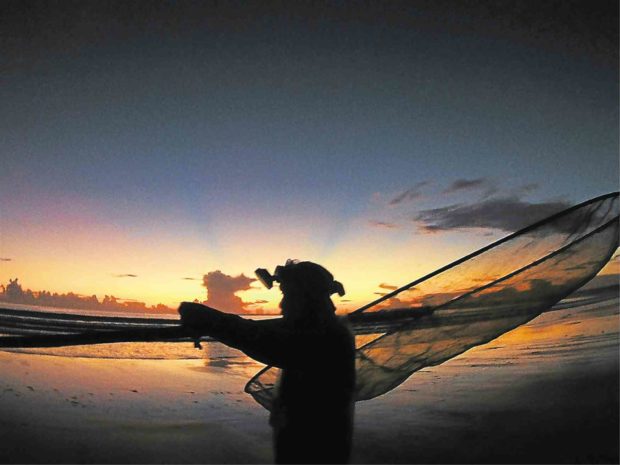
SORSOGON SUNRISE A fisherman heads home with a catch of small crabs as the sun rises in Gubat town, Sorsogon. —GEORGE GIO BRONDIAL
SORSOGON CITY — Located at the tip of Bicol Peninsula and serving as the region’s gateway to the Visayas and Mindanao, Sorsogon province is known for its rich history, natural scenery and a rich culture of mixed Bicolano and Visayan influences.
It boasts of a diverse heritage that has produced its unique food, historical places and character of its people.
Even the names of its towns evoke interest. For one, Barcelona has added appeal to tourists who know of its world-renowned namesake in Spain, according to Joyce Anne Licup-Gerona, its municipal tourism officer.
Before the Spanish colonizers called it Barcelona in 1886, it was known as Danlog.
Proof of the Spanish mold in the community is the presence of old churches, stone buildings and other magnificent structures, Gerona said.
Barcelona Church
At the center is St. Joseph Church, also known as Barcelona Church. Constructed in 1874 during the term of Gobernadorcillo Juan Evasco, it has withstood time and the elements, its walls still in their original form.
The church is made of corals, plastered with the use of lime without cement and steel bars, Gerona said.
Another surviving edifice is the Presidencia, which served as the seat of the then municipal government headed by the “gobernadorcillo.”
“It was a fortress [to repel] pirates’ attacks, with an underground tunnel leading to the church across the street,” Gerona said. It was also used as garrison during the Japanese occupation and after the war, it was again used as the seat of the municipal government, she added.
Visitors are drawn to a structure known only as “stone building,” which was once a school for children of “ilustrados,” or wealthy families, during the Spanish era. Its colonial design is a popular backdrop for couples in prenuptial photo shoots.
A modern lighthouse between the ruins is a treat for tourists. Erected in 1994 through a grant by the British government, it is solar-powered to send beams of light at night as navigational guide to ships.
Antique houses
If Barcelona has amazing ruins, Juban town is proud of its century-old houses.
“We have 10 ancestral houses in our town and most of them are found south of the poblacion (town center),” said Maria Girlie Figueroa-Gonzalgo, municipal tourism officer.
OLD WORLD The ancestral houses of Juban give tourists a glimpse of 19th century Philippines. —MICHAEL B. JAUCIAN
The houses with Spanish and other European designs were built in the 18th century. Some owners have turned these into business establishments so they can raise funds for their maintenance and preservation.
Juban, whose name was derived from “guguban,” or a place with thriving Milipi Pili trees (bonsai-type of the pili tree), is also rich in seafood, such as crabs and “alimusan” (sea catfish), which is usually cooked in coconut milk.
Hot springs
Irosin town offers tourists several hot springs originating from Mt. Bulusan, an active volcano.
“The average temperature of water ranges from 60 to 70 degrees [Celsius]. Many attest that it is a natural cure for sicknesses and ailments, such as arthritis, asthma and gout,” said Ronnie Aguilar, a provincial tourism guide. Tourists can take a dip for 2 to 10 minutes, depending on their tolerance for heat, to enjoy the springs’ therapeutic effects, he said.
Aside from being known as a “volcano town,” Bulusan is a popular destination for nature lovers, especially trekkers. Different species of trees surround the 16.43-hectare Bulusan Lake, the main attraction inside the 3,672-ha Bulusan Natural Park.
“It is considered a protected area. We are thankful because nongovernment organizations are helping preserve the flora and fauna (here),” said Nercis Huab, the lake’s operations manager.
Tourists can try kayaking for P100 for 30 minutes or cross a 340-meter hanging bridge, regarded as the longest of its kind in Bicol.
Farm of stingless bees
Residents are allowed to fish in the lake, but they must get only the grown tilapia and carp.
A tour of Bulusan would not be complete without interacting with thousands of stingless bees at a farm in San Roque village.
In Bulusan town, visitors get closer to nature at Balay Buhay sa Uma bee farm (top photo) and at Bulusan lake. —PHOTOS BY MICHAEL B. JAUCIAN
Surrounded by flowering plants, the 3.5-ha Balay Buhay sa Uma has 825 colonies of bees, said Leony Gabiazo-Dominguez, 35, caretaker of the farm, which started in 2003.
“Tourists find the creatures very attractive. They are amazed because they are not harmful,” Dominguez said.
“The market is good because the honey and granules produced by bees is very in demand. It serves as a cure for allergy, asthma and best regarded as superfood,” she said.
Surfing capital
In Gubat town, beginners in surfing from all over the world enjoy the crashing waves at Lola Sayong beach.
SURFER’S PARADISE Gubat town’s waves have been attracting amateur and professional surfers. —MARK ALVIC ESPLANA
“Since we started surfing activity in 2008, thousands of tourists [came here and] learned the surfing basics,” said Rolly Escalaro, 33, a surf instructor.
John Erick Eva, 20, another instructor, said many foreign tourists would come because of the white, powdery sand. Entrance fee to the beach is P25 per person.
After trying water activities, trekking and nature adventures, it’s time for sumptuous meals along the boulevard, also known as Reompolas Baywalk, in Sorsogon City.
Tourists may savor authentic Bicol cuisine, mostly seafood, at affordable prices from stalls while enjoying the cool sea breeze.
It is also a perfect spot to watch the sunset.

